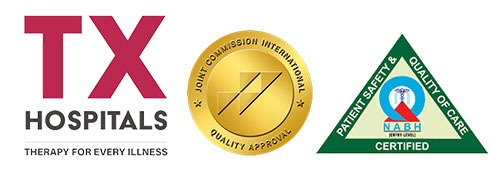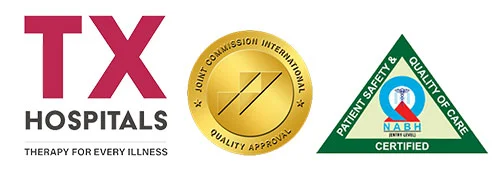Introduction
Otitis media, commonly known as a middle ear infection, is an inflammation or infection of the middle ear. It typically occurs when fluid builds up behind the eardrum due to bacterial or viral infection, often as a result of a preceding upper respiratory infection. This condition is particularly common in children but can affect people of any age. TX Hospitals, is the best hospitals for Otitis media treatment.
Symptoms:
Symptoms of otitis media may include:
- Ear pain or discomfort, which may be severe.

- Fluid drainage from the ear.
- Reduced hearing or hearing loss.
- Feeling of fullness or pressure in the ear.
- Irritability or fussiness in infants and young children.
- Difficulty sleeping or lying down.
Diagnosis:
Diagnosis of otitis media typically involves a medical examination, where a healthcare professional will examine the ear using an otoscope. They will look for signs of inflammation, fluid build-up, or infection behind the eardrum. In some cases, additional tests such as tympanometry or audiometry may be performed to assess the severity of the condition or any associated hearing loss.
Treatment:
Treatment for otitis media may vary depending on the severity and cause of the infection. It may include:
- Pain management with over-the-counter pain relievers such as acetaminophen or ibuprofen.
- Antibiotics, if the infection is bacterial in nature.
- Antihistamines or decongestants to alleviate nasal congestion and improve Eustachian tube function.
- Ear drops to reduce inflammation and pain.
- In some cases, drainage of fluid from the middle ear through a procedure called tympanocentesis.
Precautions:
To prevent otitis media and reduce the risk of recurrence, consider the following precautions:
- Practice good hand hygiene to reduce the spread of germs.
- Avoid exposure to secondhand smoke, as it can increase the risk of ear infections.
- Ensure vaccinations are up to date, as some vaccines can help prevent infections that may lead to otitis media.
- Avoid putting foreign objects in the ear, as this can damage the delicate structures and increase the risk of infection.
- Seek prompt medical attention for any symptoms of ear infection, particularly in young children who may not be able to communicate discomfort effectively.
By following these precautions and seeking appropriate treatment when needed, individuals can help prevent and manage otitis media effectively.







